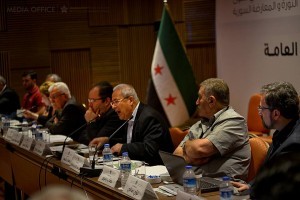Noura al-Amir: From Solitary Confinement to the National Coalition

Yasmine Maree
(Gaziantep, Turkey) – Syrian activist Noura al-Amir, 26, recalls the demonstrations of early 2011 in which she participated.
“‘Oh Sniper Sniper…here are our necks and heads’ was not merely a silly chant,” Amir said. “Demonstrators were singing it knowing the snipers lurked in wait for them. It’s the revolution, the spark that started in Tunisia and lit up the whole region.”
Today, Amir is a member of the National Coalition for the Opposition forces and the Syrian Revolution. She was inducted during the coalition’s first expansion in May of this year as an independent civil activist and “someone who works with any partner that is working honestly for the revolution,” Amir told The Damascus Bureau.

Amir, who hails from Homs, was arrested in March 2012, a year after the start of the uprising, because of her involvement in anti-government media activism. She was a passenger on a bus heading to Aleppo when security agents boarded and searched the vehicle. They found her in possession of cameras for the media office she was trying to found. She was handcuffed and given to a security quarters where she remained for days before she was transferred to the central prison in Homs.
The seven months she spent in prison did not change her convictions.
“I have my approach, and [I work towards] a free Syria only,” said Amir. “I am certain the revolution will create its own appropriate political ideology outside the traditional political orientations.”
“I want to deliver the voice of the street, which is absent from the forums,” she went on. “It was a difficult decision – I want [this voice] to be heard. I have the opportunity to change something, and if I don’t, at least I tried.”
In response to a question about reports of high salaries some members of the coalition are receiving, Amir plays down the importance of this and other such criticisms.
“All full-time members are paid, but I do not know how much,” she said, adding that this is natural in an institution like the Coalition and that paying salaries within a budget cannot buy loyalties or pressure anyone to adopt or abandon a position.
In terms of expanding the Coalition to include new faces and the role this can play in improving representation, Amir suggested that it is not the number of representatives that really matters; what matters most for Amir is the engagement of members by communicating with activists on the ground and presenting their views before the coalition.
Amir sees neither secularism nor Islamism as inherently good or bad for women’s participation in the revolution, saying “through the revolution, women broke through all the accumulated taboos.”
“We as women are fighting the patriarchal structure of society, whatever mask it hides behind, and here I hope the issue will take on its true dimensions rather than become fodder for a superficial conflict. The issue of women is bigger than this framework.”
Amir’s decision to take up the revolutionary banner was not a spontaneous one. It was the culmination of a movement for change that had been taking shape since the Damascus Spring and the Damascus Declaration. Even before the crisis, Amir, like many university students and professors at the University of Homs, was quietly active. Many of these activists were arrested between 2006 and 2008, and some are still in prison until now.
Amir was lucky to get out. But her time there still haunts her.
“I was sitting in the solitary confinement, thinking that iron is my enemy: the lock on the door was iron, the fetters were iron…the face of the warden was cold like iron, no emotions, unless he wants to burn you, then he becomes hot iron,” she said.
She spoke of the sounds of bombs and chanting, voices she didn’t know, and that sometimes she could not tell if the sounds were real or imagined.
“But the sound of the bombs, despite the fear I felt for my family and friends and the question of who had been killed or the reason for the shelling, gave me hope that the revolution was continuing, because if there hadn’t still been people and protests, the bombing would not have been happening,” she said.
After Amir left prison, she had not lost her confidence in the activists she had known and worked with for more than a year, nor did she lose her resolve to confront the regime.
“We knew that the regime would bomb and kill and displace, because it was founded on corpses and blood and it will defend itself with corpses and blood,” Amir continued.
“[The regime] drew strength from our years of ignorance and helplessness, and it knew how to limit the dreams of young Syrians to getting a degree or a job in this country or that, but what the regime failed to understand is that the people can accomplish change when they will it,” she said.
Amir does not pay much attention to the debate over the presence of young people in the coalition, nor did she know their exact number or consider age the only criterion.
“Some activists are young but they have the mind of an older person,” she said.
Amir concluded with a message for the young people who have left Syria: “Go back, go back. The martyr who died left for us his dream of a free Syria.”
